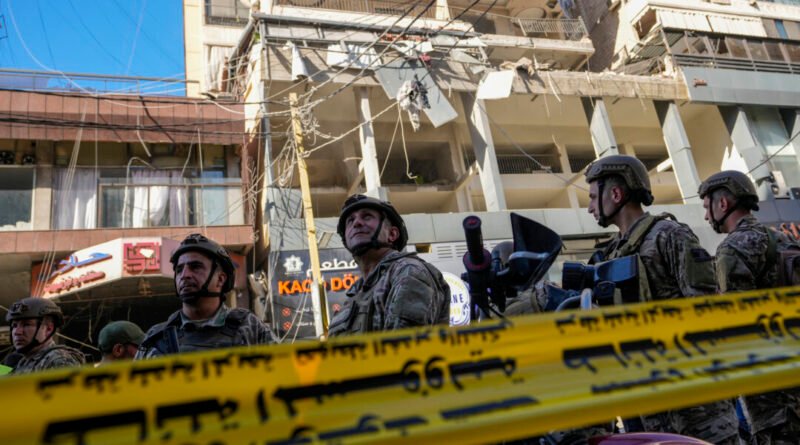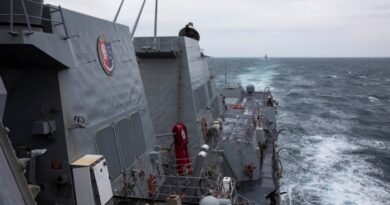Netanyahu to Deliver Speech at UN General Assembly Amid Rising Death Toll Near 700
Israeli Prime Minister Benjamin Netanyahu has stated his intention to continue operations against Hezbollah, despite international calls for a cease-fire.
Netanyahu is scheduled to speak at the U.N. General Assembly on Sept. 27 as the death toll from Israeli strikes on Hezbollah in Lebanon approaches 700, according to Beirut’s health ministry.
Recent calls for a 21-day cease-fire from the United States, France, the UK, and others seek to prevent a potential escalation to all-out war following 11 months of border skirmishes.
“Our teams deliberated on the U.S. initiative yesterday, working towards the common aim of ensuring the safe return of people to their homes. These talks will continue in the days ahead,” Netanyahu stated.
Prior to departing for New York, Netanyahu’s office issued a statement instructing Israeli troops to maintain their efforts in Lebanon with full force.
While Netanyahu’s statement did not directly address Foreign Minister Israel Katz’s dismissal of cease-fire proposals, which he referred to as misreported, the ongoing conflict indicates a reluctance to halt military actions.
Israel recently intensified its strikes, targeting Hezbollah’s military infrastructure.
Numerous attacks in Beirut have targeted senior Hezbollah leaders over the past week.
On Thursday, an airstrike in eastern Lebanon claimed the lives of 20 individuals, predominantly Syrian migrants, according to Lebanese health authorities.
Another strike on the same day resulted in two fatalities and 15 injuries after hitting an apartment complex in a southern Beirut suburb, as detailed by Lebanon’s Ministry of Public Health.
The Israel Defense Forces (IDF) confirmed taking out Hezbollah drone commander Mohammed Hussein Surour in one of the strikes, a claim later validated by the terrorist organization.
A report from Lebanon’s disaster risk management unit on Thursday revealed that Israeli strikes had resulted in 60 casualties and 81 injuries within 24 hours, bringing the total death toll since Monday to 696.
The report also highlighted more than 1,540 fatalities in Lebanon since the onset of the Hezbollah-Israel conflict last October.
Following the Beirut explosion, numerous rockets targeted the northern Israeli city of Safed, with one landing in a nearby town.

Israeli Prime Minister Benjamin Netanyahu gives a press conference in Jerusalem on Sept. 4, 2024. Abir Sultan/AFP via Getty Images
The IDF reported that 175 projectiles were launched from Lebanon on Thursday, with most being intercepted or landing in open areas.
Israel’s military preparations for a potential ground operation in Lebanon in response to Hezbollah’s rocket attacks were evident as tanks and armored vehicles were observed moving towards the northern border with Lebanon on Thursday, accompanied by a call-up of reservists.

Israeli Iron Dome air defense system fires to intercept rockets that were launched from Lebanon, as seen from Haifa, northern Israel, on Sept. 23, 2024. Baz Ratner/AP Photo
A number of tanks arrived in Kiryat Shmona, an Israeli city heavily impacted by the conflict, situated just miles from the border. Earlier, Israeli air defenses successfully intercepted a wave of rockets originating from Lebanon.
Lebanese Foreign Minister Abdallah Bouhabib urged an immediate cease-fire on all fronts, warning that continued violence at Lebanon’s border could pose a threat to international and regional peace and security.

Cars sit in traffic as they flee the southern villages amid Israeli airstrikes, in Sidon, Lebanon, on Sept. 23, 2024. AP Photo/Mohammed Zaatari
Bouhabib, addressing the U.N. General Assembly, criticized Israel for what he termed a systematic destruction of Lebanese villages along the border.
Beirut continues to support urgent efforts by the U.S. and France to secure a cease-fire before the situation spirals out of control.
Hezbollah pledged to continue launching rockets until a Gaza cease-fire is achieved, aligning with their ally Hamas, a Tehran-backed group engaged in fierce conflict with Israel for nearly a year.
The International Organization for Migration estimates that over 200,000 individuals in Lebanon have been displaced since Hezbollah began supporting Hamas with rocket fire into northern Israel. This figure includes pre-existing displacements prior to the recent escalation.
The Associated Press and Reuters contributed to this report.





